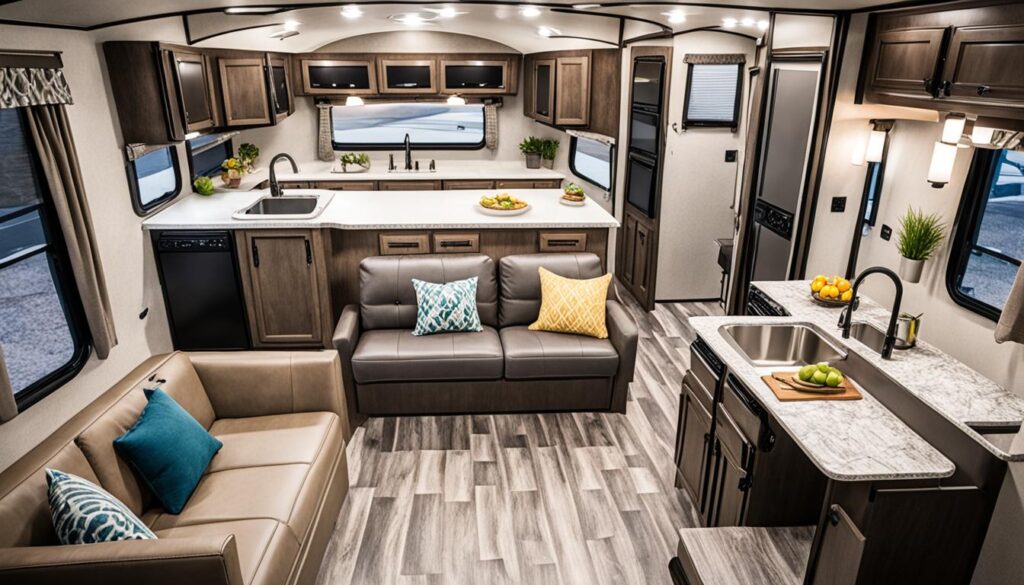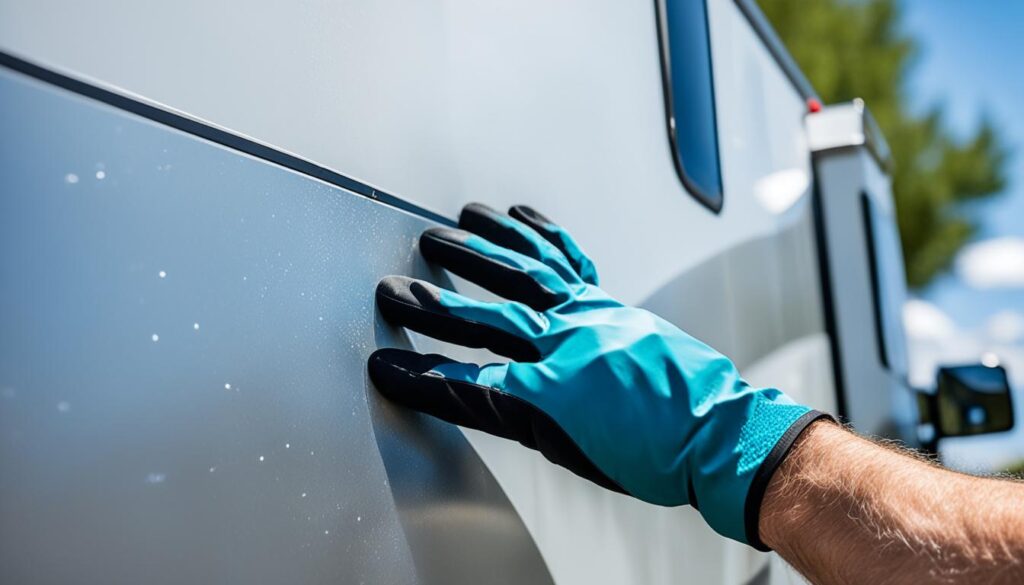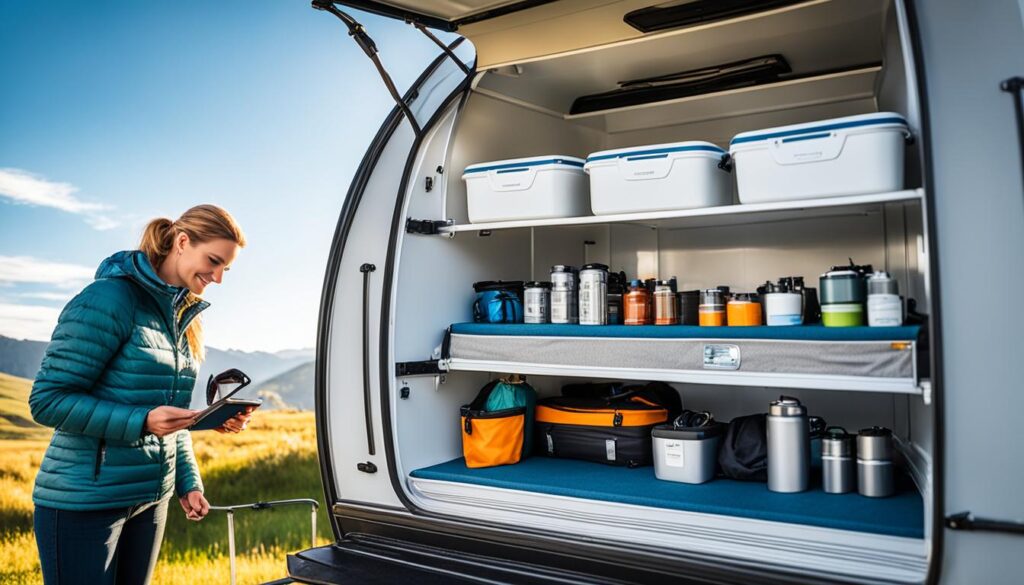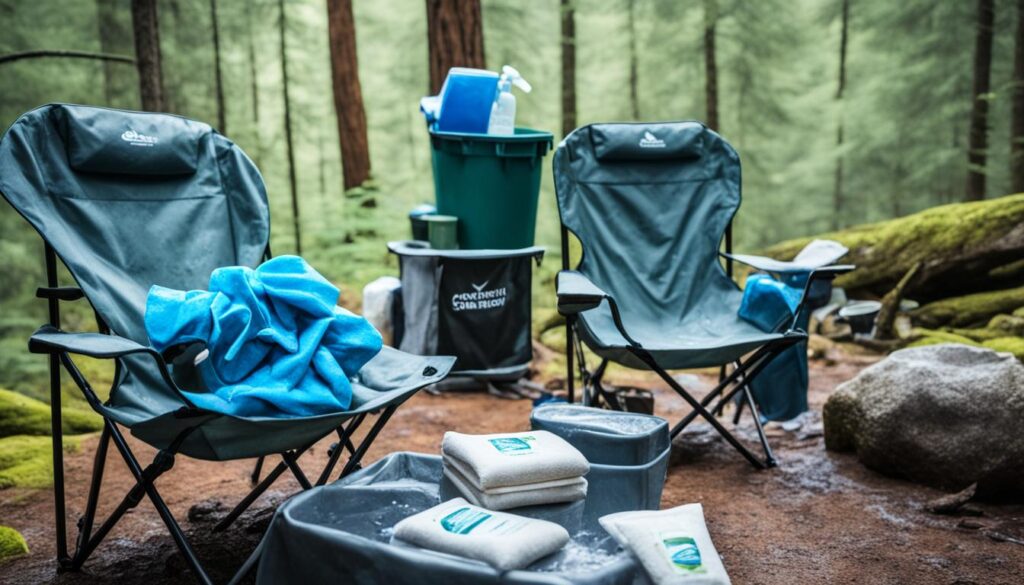Are you ready to embark on your next adventure and take to the open road? Whether you’re a seasoned traveler or a novice explorer, buying a travel trailer can be an exhilarating experience. However, with so many options available, how do you ensure that you make the right choice?
When it comes to purchasing a travel trailer, there are crucial considerations that should not be overlooked. From size and floor plan to damage inspection and lifestyle compatibility, each factor plays a vital role in finding the perfect travel companion.
Key Takeaways:
- Choosing the right size and floor plan that suits your needs is essential when buying a travel trailer.
- Thoroughly inspecting the trailer for both aesthetic and mechanical damage is crucial.
- Taking your lifestyle and towing vehicle into account ensures compatibility and a smooth journey.
- Be prepared for the long-term costs of owning a travel trailer, including repairs and maintenance.
- Consider your storage needs and the challenges that come with setting up and breaking down the trailer.
Contents
Decide on Size and Floor Plan
When buying a travel trailer, one of the most important considerations is choosing the right size and floor plan that will best suit your needs. The size of the trailer should be determined by factors such as the number of people it will accommodate and the towing capacity of your car or truck.
- Exterior size: Consider the dimensions of the trailer to ensure it can be safely towed and parked in your desired locations.
- Interior dimensions: Think about the layout and design of the trailer’s interior. Take note of the living area, kitchen space, sleeping arrangements, and bathroom size.
- Storage space: Evaluate the amount of storage available in the trailer. Will it be sufficient for all the items you plan to bring along on your travels?
- Bathroom and shower size: Pay attention to the size and functionality of the bathroom and shower facilities. Ensure they meet your personal comfort and convenience needs.
Making a list of essential items you plan to bring can help you determine if the chosen trailer has enough space to accommodate your needs. It’s important to strike a balance between size and functionality to ensure a comfortable and enjoyable travel experience.

Choose a floor plan that suits your lifestyle and preferences. Finding the right size travel trailer requires careful consideration of your specific needs and requirements.
Check for Damage and Mechanical Issues
Before purchasing a travel trailer, it’s crucial to thoroughly inspect it for any damage, both in terms of aesthetics and mechanical functionality. This step is essential to ensure you make an informed decision and avoid costly repairs down the line. Here are some key areas to focus on when conducting your inspection:
Interior Inspection
Start by walking barefoot on the trailer’s floor to detect any soft spots, which may indicate water damage or structural issues. Pay attention to the corners and edges as well. Inspect the cabinets, drawers, and other storage areas to check for signs of wear and tear, such as loose hinges or damaged finishes.
Exterior Inspection
Inspect the exterior of the travel trailer for any visible signs of damage, such as dents, scratches, or rust. Pay close attention to the windows, doors, and exterior compartments to ensure they open and close smoothly without any damage or jamming.
Mechanical Components
Having the mechanical components of the travel trailer thoroughly checked by a professional is crucial for your safety and the trailer’s performance. Here are some key components that should be inspected:
- Brakes: Ensure that the brakes are in good working condition and respond properly when applied.
- Axles: Examine the axles for any signs of damage or wear. They should be properly aligned and free from any excessive rust or corrosion.
- Tires: Check the condition of the tires, including tread depth and any signs of cracking or bulging. Ensure they are properly inflated and have even wear.
- Towing Capacity: Confirm that the towing capacity of the trailer matches your vehicle’s capabilities. Consult your vehicle’s manual or consult with a professional to ensure a safe towing experience.
Operational Systems
Make sure to thoroughly test all the operational systems of the travel trailer to ensure they are in proper working order. This includes checking the electrical system, water lines, plumbing, and sewer systems. Test all appliances, such as the refrigerator, stove, and air conditioning unit, to ensure they function correctly.
By conducting a comprehensive inspection of the travel trailer, you can identify any potential issues and make an informed decision before finalizing your purchase.

Consider Your Lifestyle and Towing Vehicle
When purchasing a travel trailer, it’s crucial to take into account your unique lifestyle requirements and the compatibility of your towing vehicle. By considering these factors, you can ensure a comfortable and safe travel experience.
If you plan to use your travel trailer for winter camping or in colder climates, it’s advisable to choose a 4-season trailer. These trailers are designed with insulation and heating systems that can withstand low temperatures, providing you with a cozy and enjoyable camping experience.
Another important factor to consider is the number of people who will typically be using the travel trailer. If you have a larger family or frequently travel with friends, you may want to opt for a larger trailer with multiple sleeping areas or bunk beds.
Once you have determined the size and features that suit your lifestyle, it’s essential to ensure that your towing vehicle is capable of safely towing the travel trailer. The towing capacity of your vehicle refers to the maximum weight it can tow, including the weight of the trailer and its contents.
To determine the appropriate towing capacity, you need to consider the gross weight of the trailer, including its fully loaded weight and the weight of any additional items you plan to bring along. It’s generally recommended to add 1000 pounds to the labeled dry weight of the trailer to account for personal belongings, camping gear, and other essentials.
Matching your towing vehicle to the RV’s towing capacity will help maintain stability and control while on the road. Exceeding the towing capacity of your vehicle can result in unsafe driving conditions and potential damage to both your vehicle and the trailer.
Always consult your vehicle’s owner’s manual or speak with a professional to ensure that your towing vehicle is suitable for the travel trailer you intend to purchase.
Budget for Repairs and Considerations
When it comes to owning a travel trailer, it’s important to understand that there are expenses beyond the initial purchase price. To avoid any financial surprises down the road, it’s crucial to have a budget for repairs and maintenance. This budget should include money set aside for both expected and unexpected repairs, as well as regular maintenance tasks.
Regular maintenance tasks for your travel trailer may include checking and replacing tires, inspecting and servicing brakes, and ensuring the functionality of electrical and plumbing systems. By staying proactive and taking care of these maintenance tasks, you can extend the lifespan of your travel trailer and prevent more costly repairs in the future.
Another consideration in your budget should be insurance coverage for your travel trailer. Research and compare different insurance options to find the policy that suits your needs best. Proper coverage will give you peace of mind and financial protection in case of accidents, theft, or damage to your travel trailer.
Lastly, it’s important to be prepared for the responsibilities and challenges that come with owning a travel trailer. This includes setting up and breaking down your trailer at campsites, finding suitable storage when not in use, and adapting to various weather conditions. Being aware of these factors will help ensure a smooth and enjoyable experience as a travel trailer owner.
FAQ
What factors should I consider when buying a travel trailer?
When buying a travel trailer, it’s important to consider factors such as size, storage, and condition. You should also think about your lifestyle and how you plan to use the trailer.
How do I decide on the size and floor plan for a travel trailer?
To decide on the size and floor plan for a travel trailer, consider the exterior and interior dimensions, storage space, and bathroom size. Making a list of items you want to bring can help you determine the space you need.
What should I look for when checking for damage and mechanical issues in a travel trailer?
When checking for damage and mechanical issues in a travel trailer, walk the interior barefoot to check for floor and corner damage. Inspect cabinets and storage areas for damage. Additionally, have a professional check the brakes, axles, tires, and towing capacity. Ensure all operational systems are functional.
How can I choose a travel trailer based on my lifestyle and towing vehicle?
To choose a travel trailer based on your lifestyle, consider whether you plan to camp during winter and the number of people who will typically be inside the trailer. Make sure your towing vehicle is rated to tow the weight of the trailer, plus the weight of loaded items.
What costs should I budget for when owning a travel trailer?
When owning a travel trailer, you should budget for repairs and maintenance. Set aside money for unexpected repairs and regular maintenance tasks. Research and compare insurance options for your travel trailer. Be prepared for responsibilities such as setting up and breaking down, finding storage, and dealing with weather conditions.






